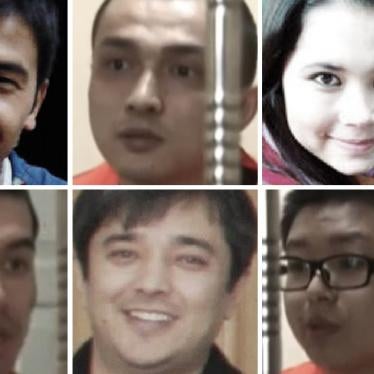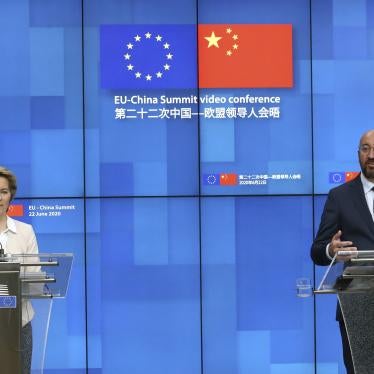(New York, April 6, 2022) – The Chinese government should respect the right to health and other basic rights in its response to the Covid-19 surge in the country, Human Rights Watch said today.
Authorities in Shanghai have imposed draconian lockdown measures since March 2022 that have significantly impeded people’s access to health care, food, and other life necessities. An unknown number of people have died after being denied medical treatment for their non-Covid related illnesses. The authorities have separated small children from their parents after positive Covid-19 tests under the “Zero Covid” policy, which requires those testing positive to isolate in a hospital or designated facility. And the authorities have hindered discussion of public concerns surrounding the Covid response by further tightening restrictions on social media.
“The Chinese government’s ‘Zero-Covid’ approach to pandemic control by imposing stringent citywide lockdowns has resulted in the systematic denial of medical needs of people with serious but non-Covid related illnesses,” said Yaqiu Wang, senior China researcher at Human Rights Watch. “Authorities should treat the health of citizens as the end goal, not a zero-Covid infection rate.”
On April 3, the Chinese government announced the deployment of thousands of military personnel to Shanghai to assist in the mandatory testing of all 25 million residents for the virus that causes Covid-19. On April 4, Shanghai authorities said the city would indefinitely remain under lockdown – meaning that residents are not allowed to leave their homes – as it reviews results of the mass Covid testing.
Numerous netizens took to Chinese social media to share stories of their or their loved ones being denied access to medical care for non-Covid related illnesses either due to hospitals being closed because of Covid-restrictions, or the lack of health care workers because they were quarantined or got diverted to administer Covid tests. Officials denied some patients care because they had a Covid infection or they did not have proof of a negative Covid test. A Shanghai nurse, Zhou Shengni, died from asthma after she was turned away from the hospital at which she worked because the emergency room was closed for disinfection and no other facilities had been made available. A woman died after not being able to receive hemodialysis because she was barred from leaving her residential compound. A 77-year-old man with kidney disease died at a hospital after the hospital refused to perform dialysis on him immediately due to his Covid infection.
Netizens have reported threats of self-harm or violence when family members were denied access to health care. “I don’t care about people dying, [you] just can’t enter if you don’t have a [negative] Covid test,” a security guard at a hospital reportedly told a man who came to seek treatment for his father, who was vomiting blood. The man wrote in a social media post that he then told the security guard, “I’ll stab you to death, and I don’t care, how’s that?” The father was then admitted. A mother threatened to jump off her apartment building so she could get her daughter, who was suffering from a high fever, tested for Covid and admitted to the hospital.
The authorities have forcibly separated some children who tested positive from their parents to be quarantined in medical facilities. A video that went viral showed dozens of toddlers and infants crammed on metal-barred beds and crying at a facility in Shanghai. Several mothers of young children told reporters or wrote on social media that they were barred from visiting their children, and hospitals failed to update them for days about their children’s situation. “Separation from my loved ones scares me more than anything else,” a mother whose 2-year-old son had been taken away to be quarantined told the media. Another mother of a 2-year-old daughter called the situation “totally inhumane.”
In response to public outrage, Shanghai authorities defended the policy, stating that anyone found positive – regardless of age – must be isolated from non-infected people, and that a parent can only be quarantined with their child if both are infected.
The United Nations Convention on the Rights of the Child, to which China is a party, states that “a child shall not be separated from his or her parents against their will, except when competent authorities subject to judicial review determine, in accordance with applicable law and procedures, that such separation is necessary for the best interests of the child.”
The Chinese government has continued to try to control the flow of information regarding the pandemic and to censor criticism of the government’s Covid response. Ludong University in Shandong province expelled a graduate student, Sun Jian, after he staged a lone protest opposing the campus lockdown in April. Numerous lockdown-related posts on the social media platform Weibo were censored. In March, Shanghai authorities ordered a netizen to delete a Weibo post in which he spoke about residents in his residential compound forcing out a group of migrant workers living in the compound.
A video circulating on Weibo showed journalists refusing to interview shop owners who did not receive government aid, with one journalist saying, “only those who received aid can be interviewed.” Zhu Xia, a state media broadcaster in Liaoning province, was fired from her job after she urged viewers during livestreaming to protect themselves amid the new Covid surge “for reasons that can’t be said.”
International human rights law, notably the International Covenant on Civil and Political Rights, which China has signed but not ratified, requires that restrictions on human rights in the name of public health or a public emergency meet requirements of legality, evidence-based necessity, and proportionality. Restrictions such as quarantine or isolation of suspected infectious or infectious people must, at a minimum, be provided for and carried out in accordance with the law. They must be strictly necessary to achieve a legitimate objective, the least intrusive and restrictive available to reach the objective, based on scientific evidence, neither arbitrary nor discriminatory in application, of limited duration, respectful of human dignity, and subject to review.
When quarantines are imposed, governments are obligated to ensure access to food, water, and health care. Rights-restricting measures should also be carried out with consideration for the public’s willingness to comply with government control efforts. Especially in large-scale responses, voluntary compliance with home isolation and social distancing can be more compatible with human rights and more effective than coercive measures and harsh enforcement, which can lead individuals to avoid screening and care. However, public support requires the government to act with transparency, due process, and fairness.
“Denying people’s human rights in the name of addressing the new spike in Covid cases is counterproductive,” Wang said. “The authorities should listen to people’s pleas and provide appropriate health care for all those in need.”








